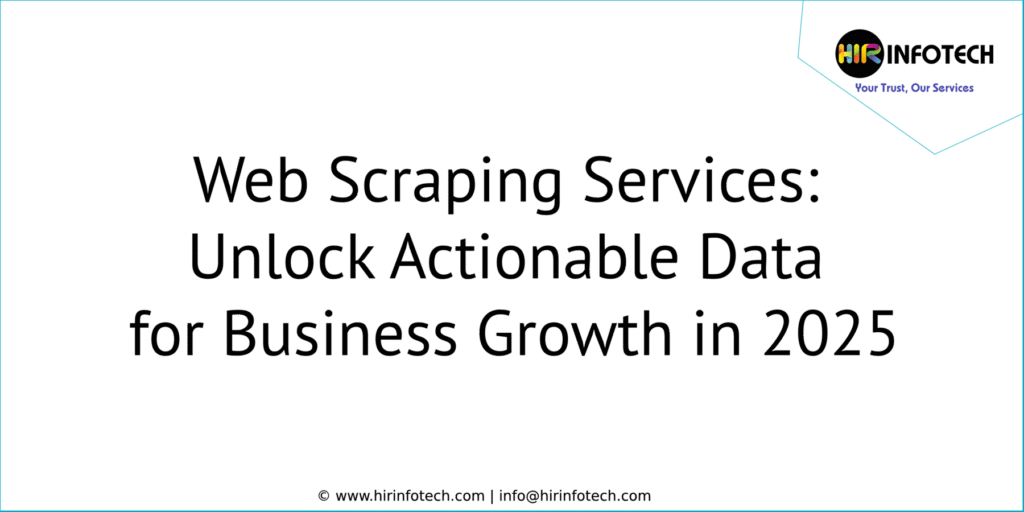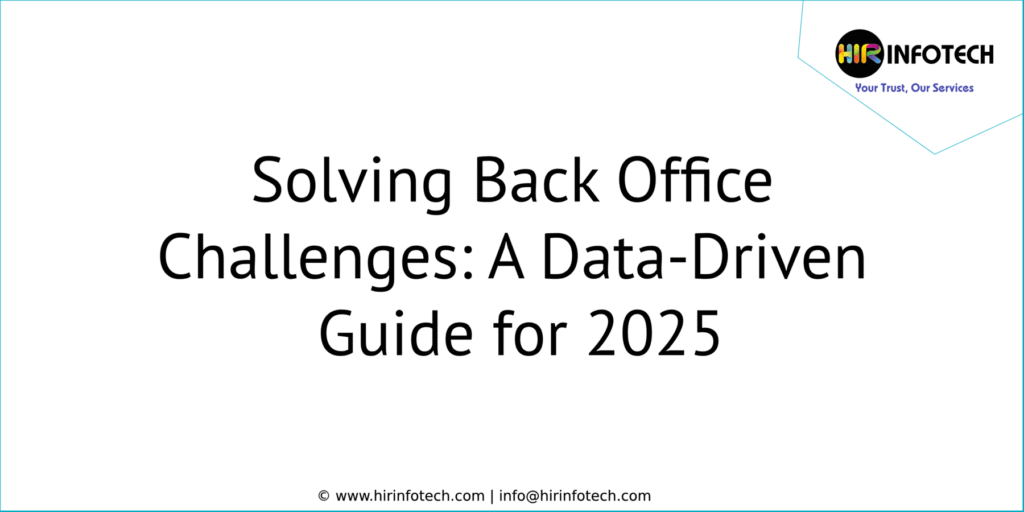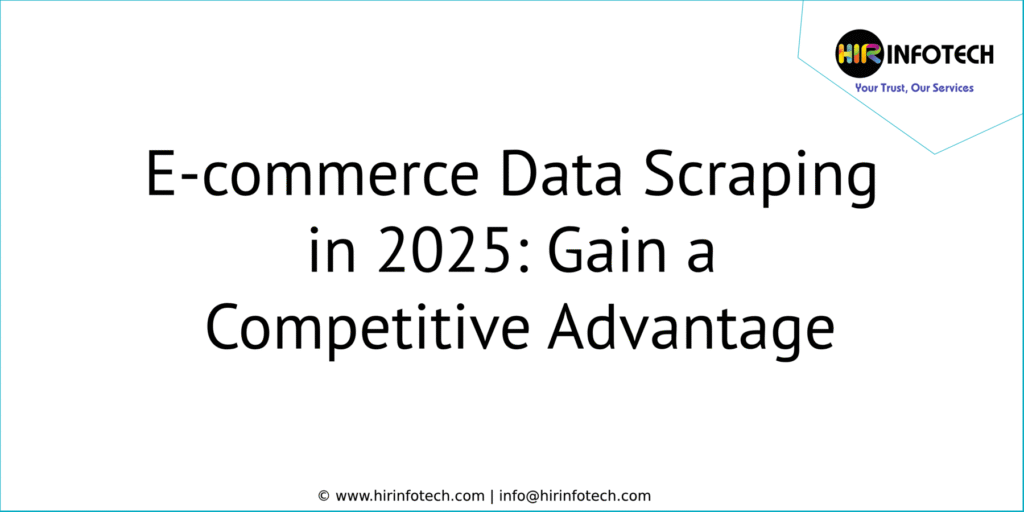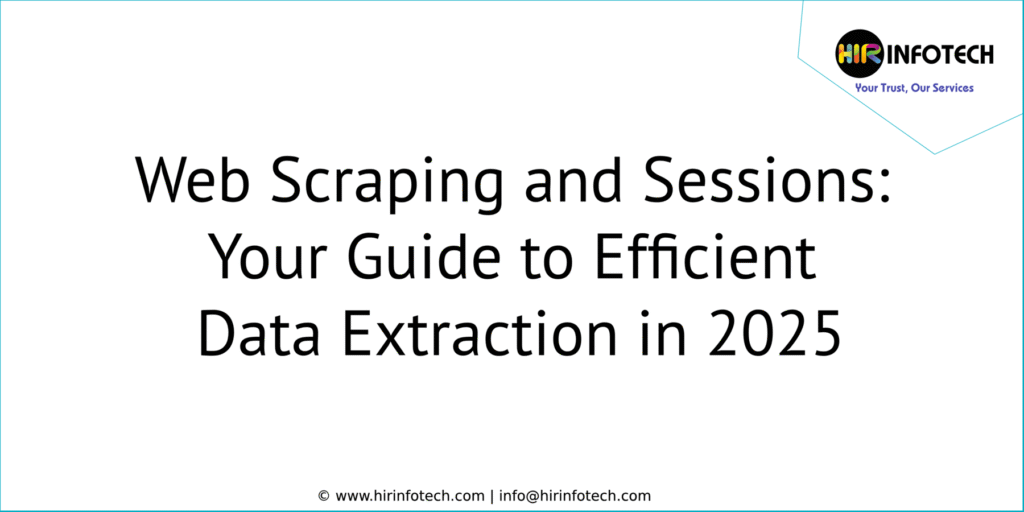
ustom Web Scraping Services?
While “do-it-yourself” scraping tools exist, custom services (like those offered by Hir Infotech) provide crucial advantages:
- Expertise: Experienced professionals handle the technical complexities.
- Scalability: Collect large volumes of data from multiple sources.
- Data Quality: Ensure the data is accurate, complete, and consistent.
- Complex Website Handling: Scrape data from websites with dynamic content, anti-scraping measures, and complex structures.
- Maintenance: Websites change. A custom service will keep your scrapers running smoothly.
- Legal Compliance: Ensure your scraping activities are ethical and legal.
- Integration: Seamlessly integrate scraped data with your existing systems (CRM, databases, BI tools).
- Time Savings: Focus on using the data, not collecting it.
- Customized Solutions: Fully customized solution for your business.
Common Data Points Extracted via Web Scraping (Across Industries)
The specific data you scrape depends on your industry and goals. Here’s a comprehensive overview of common data points:
1. E-commerce and Retail:
- Product Data:
- Product Names and Descriptions
- Prices (regular and sale prices)
- Product Images
- Product Specifications (size, color, materials, etc.)
- SKU (Stock Keeping Unit) Numbers
- Product Availability (in stock, out of stock)
- Shipping Information
- Product Variants (different sizes, colors, etc.)
- Customer Reviews:
- Review Text
- Ratings (star ratings)
- Review Date
- Reviewer Information (if publicly available)
- Seller Information:
- Seller Name
- Seller Ratings
- Seller Location
- Category and Subcategory Information:
- Website Navigation Structure
2. Real Estate:
- Property Listings:
- Address
- Price
- Property Type (house, apartment, condo, etc.)
- Bedrooms and Bathrooms
- Square Footage
- Property Description
- Listing Date
- Listing Agent Contact Information
- Property Images
- Property History (previous sale prices)
- Neighborhood Data:
- School Ratings
- Crime Rates
- Demographics
- Nearby Amenities
- Rental Data:
- Rental Rates
- Vacancy Rates
- Lease Terms
3. Finance and Investment:
- Stock Market Data:
- Stock Prices (real-time and historical)
- Trading Volume
- Stock Symbols (tickers)
- Company Financial Statements (income statement, balance sheet, cash flow statement)
- Analyst Ratings
- Dividend Information
- News and Sentiment (about specific companies or the overall market)
- Economic Data:
- GDP Growth
- Inflation Rate
- Unemployment Rate
- Interest Rates
- Consumer Spending
- Company Information:
- Company Name
- Website
- Address
- Key Personnel
- Financial Performance
- Funding Rounds (for startups)
- Alternative Data:
- News Articles
- Social Media Sentiment
4. Travel and Hospitality:
- Hotel Data:
- Hotel Name
- Location
- Room Rates
- Amenities (pool, gym, restaurant, etc.)
- Customer Reviews
- Availability
- Flight Data:
- Airline
- Flight Number
- Departure and Arrival Times
- Origin and Destination Airports
- Prices
- Rental Car Data:
- Rental Company
- Car Type
- Prices
- Availability
- Vacation Rentals:
- Information Similar to Hotel + Property Data
5. Marketing and Advertising:
- Contact Information:
- Name
- Job Title
- Email Address
- Phone Number
- Company Name
- LinkedIn Profile URL
- Company Information:
- Industry
- Company Size
- Location
- Social Media Data:
- Posts, Comments, Shares
- Follower Counts
- Engagement Metrics
- Competitor Marketing Activities:
- Website Content
- Social Media Posts
- Advertising Campaigns (keywords, ad copy)
6. Human Resources and Recruitment:
- Job Postings:
- Job Title
- Company Name
- Location
- Salary Range
- Job Description
- Required Skills
- Application Deadline
- Candidate Information (from public profiles):
- Name
- Job Title
- Skills
- Experience
- Education
- LinkedIn Profile URL
7. Healthcare (with strict adherence to privacy regulations):
- Drug Information:
- Drug Name
- Dosage
- Side Effects
- Manufacturer
- Pricing (from publicly available sources)
- Clinical Trial Information:
- Trial Title
- Study Status
- Eligibility Criteria
- Location
- Provider Directories:
- Doctor Name
- Specialty
- Location
- Contact Information
- Disease statistics: Get details from authorized sources.
8. News and Media:
- Article Data:
- Headline
- Author
- Publication Date
- Article Text
- Source URL
- Keywords
- Sentiment Analysis Data:
- Overall sentiment (positive, negative, neutral) of articles or social media posts
9. Government and Public Sector:
- Public Records:
- Census Data
- Economic Statistics
- Building Permits
- Crime Statistics
- Environmental Data
- Legislation and Regulations:
- Bill Text
- Status Updates
- Voting Records
10. Automotive:
- Vehicle Data:
- Make, Model, Year
- Specifications
- Pricing (new and used)
- Reviews
- Dealer Information:
- Location
- Inventory
11. Social Media
- Post Data:
- Content
- Timestamps
- Engagement metrics
- User Data:
- Profile Information.
12. Education
- Course Details
- University Ranking
- Faculty Information
This list provides a comprehensive overview. The specific data points you need will depend on your unique business objectives. A custom web scraping service can tailor the extraction process to your exact requirements.
Future Trends in Web Scraping Services (2025 and Beyond)
The field of web scraping is constantly evolving. Here are some key trends to watch:
- AI-Powered Scraping: Artificial intelligence (AI) and machine learning (ML) are increasingly being used to:
- Automate Website Navigation: AI can help scrapers navigate complex websites more efficiently.
- Handle Dynamic Content: AI can improve the handling of websites that use JavaScript and other dynamic technologies.
- Adapt to Website Changes: AI-powered scrapers can automatically adjust to changes in website structure, reducing the need for manual maintenance.
- Improve Data Quality: AI can help with data cleaning, validation, and deduplication.
- Extract Data from Unstructured Sources: AI, particularly Natural Language Processing (NLP), can extract meaning from unstructured text data (like news articles, social media posts, and customer reviews).
- Increased Focus on Ethical and Legal Compliance: As data privacy regulations become stricter, web scraping services will need to prioritize ethical and legal compliance. This includes:
- Respecting Website Terms of Service: Adhering to website rules regarding automated data collection.
- Protecting Personal Data: Complying with GDPR, CCPA, and other privacy laws.
- Transparency and Disclosure: Being open about scraping activities.
- Rise of Real-Time Scraping: Businesses increasingly need real-time data to make timely decisions. Web scraping services will need to provide faster and more frequent data updates.
- Headless Browsers and Advanced Scraping Techniques: To overcome anti-scraping measures, scrapers will increasingly rely on:
- Headless Browsers: Browsers that run without a graphical user interface (like Puppeteer and Playwright). These can simulate human browsing behavior more effectively.
- Advanced Proxy Management: Sophisticated proxy rotation and management techniques to avoid IP blocking.
- CAPTCHA Solving Services: Automated solutions for bypassing CAPTCHAs.
- Integration with Data Analytics and Business Intelligence Tools: Web scraping services will increasingly integrate with other data tools to provide a seamless data pipeline. This includes:
- Data Warehouses: Storing scraped data in centralized data warehouses.
- Business Intelligence (BI) Platforms: Connecting scraped data to BI tools like Tableau, Power BI, and Looker for visualization and analysis.
- Machine Learning Platforms: Using scraped data to train machine learning models.
- Focus on Data Quality and Governance: Businesses will place greater emphasis on ensuring the accuracy, completeness, and consistency of scraped data. Data governance policies will become more important.
- Scraping from Mobile Apps: As mobile usage continues, scraping will extract data.
- Edge Computing: Processing scraped data.
Why Choose Hir Infotech for Web Scraping Services?
Hir Infotech stands out as a leading provider of custom web scraping services. Here’s why:
- Expertise and Experience: Our team has extensive experience in web scraping, data extraction, and data analysis. We’ve worked with clients across various industries.
- Custom Solutions: We don’t offer one-size-fits-all solutions. We tailor our services to your specific needs and requirements.
- Cutting-Edge Technology: We use the latest web scraping techniques and tools, including AI-powered scraping, headless browsers, and advanced proxy management.
- Data Quality Assurance: We have rigorous quality control processes in place to ensure the accuracy, completeness, and consistency of the data we deliver.
- Scalability: We can handle projects of any size, from small-scale data collection to large-scale, ongoing scraping.
- Legal and Ethical Compliance: We adhere to all relevant laws and regulations, including data privacy laws (GDPR, CCPA). We prioritize ethical scraping practices.
- Transparent Communication: We keep you informed throughout the entire process. You’ll have a dedicated project manager.
- Competitive Pricing: We offer cost-effective solutions without compromising on quality.
- Fast Turnaround Time: We deliver data quickly and efficiently.
- Data Security: We implement robust security measures to protect your data.
- Dedicated Support: Our team is here to help you succeed.
Process of Providing Web Scraping Services (Hir Infotech’s Approach)
Here’s a detailed breakdown of how Hir Infotech delivers custom web scraping services:
- Initial Consultation and Requirements Gathering:
- Understanding Your Needs: We start by understanding your business goals, target audience, and specific data requirements.
- Defining Scope: We work with you to define the scope of the project, including the websites to be scrapped, the data points to be extracted, the frequency of scraping, and the desired data format.
- Legal and Ethical Review: We assess the legal and ethical implications of scraping the target websites. We ensure compliance with all relevant regulations.
- Website Analysis and Feasibility Study:
- Technical Assessment: Our experts analyze the target websites to determine the best scraping approach. This includes:
- Website Structure: How is the data organized on the page?
- Dynamic Content: Does the website use JavaScript or other dynamic technologies?
- Anti-Scraping Measures: Are there any challenges to overcome (CAPTCHAs, IP blocking)?
- Data Volume: How much data needs to be collected?
- Data Complexity: How difficult is it to extract the specific data points?
- Feasibility Report: We provide a detailed report outlining the feasibility of the project, the proposed approach, and a cost estimate.
- Technical Assessment: Our experts analyze the target websites to determine the best scraping approach. This includes:
- Scraper Development and Testing:
- Custom Scraper Creation: Our developers build a custom web scraper (typically using Python and libraries like Scrapy, Beautiful Soup, and Selenium) tailored to your specific requirements.
- Proxy Integration: We set up a robust proxy infrastructure to ensure reliable and anonymous scraping.
- Error Handling: We implement error handling mechanisms to deal with unexpected issues (website changes, network errors).
- Rigorous Testing: We thoroughly test the scraper to ensure it extracts data accurately and efficiently.
- Data Extraction and Delivery:
- Automated Scraping: The scraper runs automatically, collecting the data from the target websites.
- Data Storage: The scraped data is stored securely.
- Data Delivery: You receive the data in your preferred format (CSV, Excel, JSON, database integration, API).
- Frequency: Data delivery is set as per needs (real-time, hourly, daily, weekly, etc.).
- Data Cleaning and Quality Assurance:
- Data Validation: We implement checks to ensure data accuracy and consistency.
- Data Cleaning: We remove duplicates, handle missing values, and standardize formats.
- Data Transformation: We convert the data into a structure suitable for your analysis or systems.
- Quality Control: We have strict quality control procedures to ensure the highest data quality.
- Ongoing Monitoring, Maintenance, and Support:
- Performance Monitoring: We continuously monitor the scraper’s performance to ensure it’s running smoothly.
- Website Change Management: We update the scraper as needed to adapt to changes in website structure or anti-scraping measures.
- Technical Support: We provide ongoing support to address any questions or issues.
- Data Updates: We provide regular data updates based on your chosen frequency.
- Integration With Your Systems:
- CRM Integration: Load leads directly into your CRM (e.g., Salesforce, HubSpot).
- Database Integration: Store data in your preferred database (e.g., MySQL, PostgreSQL, MongoDB).
- BI Tool Integration: Connect data to business intelligence platforms (e.g., Tableau, Power BI) for visualization and analysis.
- API Integration: Deliver data via a custom API to your applications.
Frequently Asked Questions (FAQs)
- What type of websites you cannot scrap? We respect the website’s terms of service. If scraping is prohibited, we will not proceed.
- Do you provide data cleaning and validation? Yes. Data quality is our top priority.
- How do you handle websites that change frequently? We provide ongoing maintenance to adapt scrapers.
- What data formats do you support? We can deliver data in CSV, Excel, JSON, and more.
- Can you integrate scraped data with my CRM? Yes. We offer seamless integration.
- What is your pricing model? Contact us for a custom quote.
- Do you comply with data privacy regulations? Absolutely.
Ready to leverage the power of web scraping for your business? Hir Infotech provides expert, custom web scraping services to deliver high-quality, actionable data across all industries. Contact us today for a free consultation and let’s discuss how we can help you achieve your data-driven goals!



